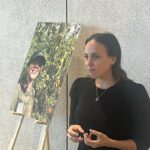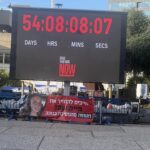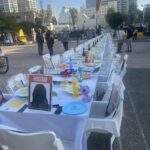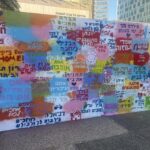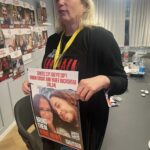Bearing Witness – Day 5 (November 30, 2023)
Our last day on this solidarity mission was both emotional and inspirational. We head back to San Diego and will begin sharing our stories and transmit the sacred ones shared with us to our friends and communities at home.
Our day began with a powerful session with Rabbi Donniel Hartman (one of my favorite teachers at the Hartman Institute).
Most of what is occupying his brilliant mind right now is thinking about tomorrow and how we prepare for it. Today, when we think about the future of Israel, the greatest challenge to Israel’s democracy is not fascists or messianic ideologues, it’s now fear. When you feel that somebody wants to kill you – your primary concern is about your human right to defend yourself, and it’s hard to ask about or focus on any subsequent concerns.
He noted a few important things about “tomorrow”:
1. There is tremendous unity at present (aside from a few outliers). However, when the war resumes, you cannot press pause on the war. The umbrella of October 7th is and will get weaker. And as we resume, Israel is not going to be able to fight in south of Gaza the same way it did in the north, as the Palestinians are on the spear of Israel, and the world continues to frame the conflict into a global one.
2. As the war becomes more complex, and moral issues of casualties arise, we’re going to encounter a Jewish community that’s unprepared and uninterested. So how do we get Israeli’s and North American Jewry prepared?
3. Israeli Jews still want to know – how do they live next to evil? If you say you want to kill me post 10/7, I take that more seriously.
4. After the war, there is going to a huge political current of unity. A coalition to rebuild the divides, but these coalitions will never talk about controversial issues – pluralism, women’s issues, etc. How do we now navigate those issues.
His final charge: “I always worry about the quality of survival. As people who care, I want to draft you into the thought fabric of tomorrow.”
As we pondered Donniel’s critical messages, we turned to the work of JAFI (Jewish Agency for Israel), and met with a young woman Diana, a Ukrainian émigré who moved to Israel with her two young children as a survivor of the war between Ukraine and Russia. Only living here for a year, she now faces red alerts and living through a second war. She expressed the warm embrace of Israeli society and knows that she will make it through.
A few more powerful visits framed our afternoon. The first was to the Brothers and Sisters for Israel Command Center in Tel Aviv. We met venture capitalists and other hi tech leaders who are now leading this massive grassroots organization, originally mobilized as a pro-democracy political organization and overnight, was transformed into a center for humanitarian aid response. It’s important to understand that the government has been absent in supporting victims and survivors of the massacre, and civil society needed to step up to fill this void. From maintaining the agriculture and farms in the Gaza envelope and rescuing individuals from the region who have nowhere else to turn, to providing missing items and equipping and training all emergency response units around the border, their support serves tens of thousands on a weekly basis. It was awe-inspiring to see how they are stepping up in the absence of other support.
Next, we spent some time at the empty diner table installation, a reminder of the hostages that remain unseated at their own dining tables. The exhibit is surrounded by other art installations and tent spaces where family members of hostages are present to connect with the public.
This time led us to the Bring Them Home Now headquarters, where we met with family members of current and previous hostages. They shared more harrowing stories of treatment by those who’ve returned. We learned that a grandfather, who is still in Gaza, would take sick Palestinians from the border of Gaza weekly for medical treatments, and remained a staunch advocate for schooling in Gaza.
We ended our time together, sharing powerful reflections as we begin to focus on this next chapter of advocacy stateside. A takeaway: all of you who have chosen to read these daily missives are empowered to be advocates – to share these words with those who need to hear them. Our work of advocacy is just beginning. It’s not about convincing someone that you have the answer or the only truth. Rather, it’s about conveying someone’s story and experience as we bear witness from near or far.
If you can get to Israel, please go (it was really hard to leave). They need us and we need them. Profound gratitude to the Jewish Federation of San Diego for organizing this first solidarity mission. The impact was immeasurable. Am Yisrael Chai!

